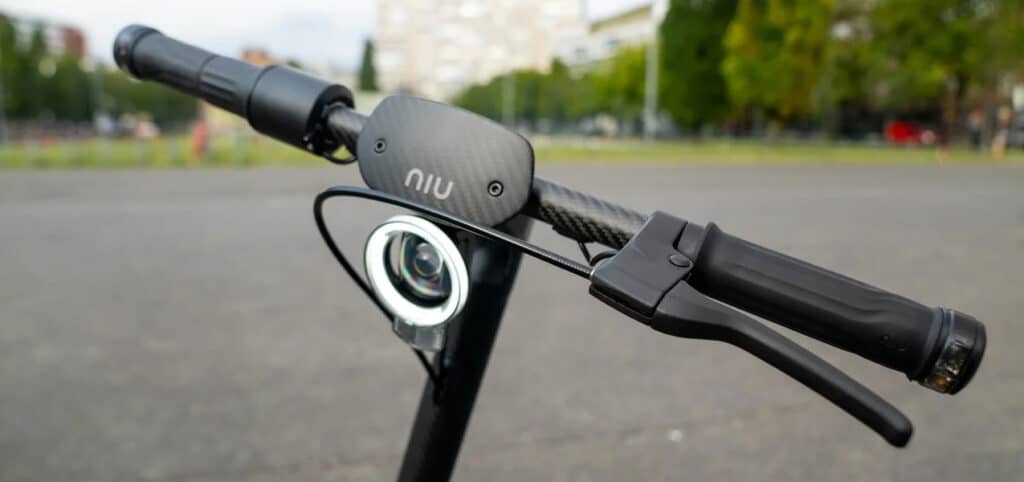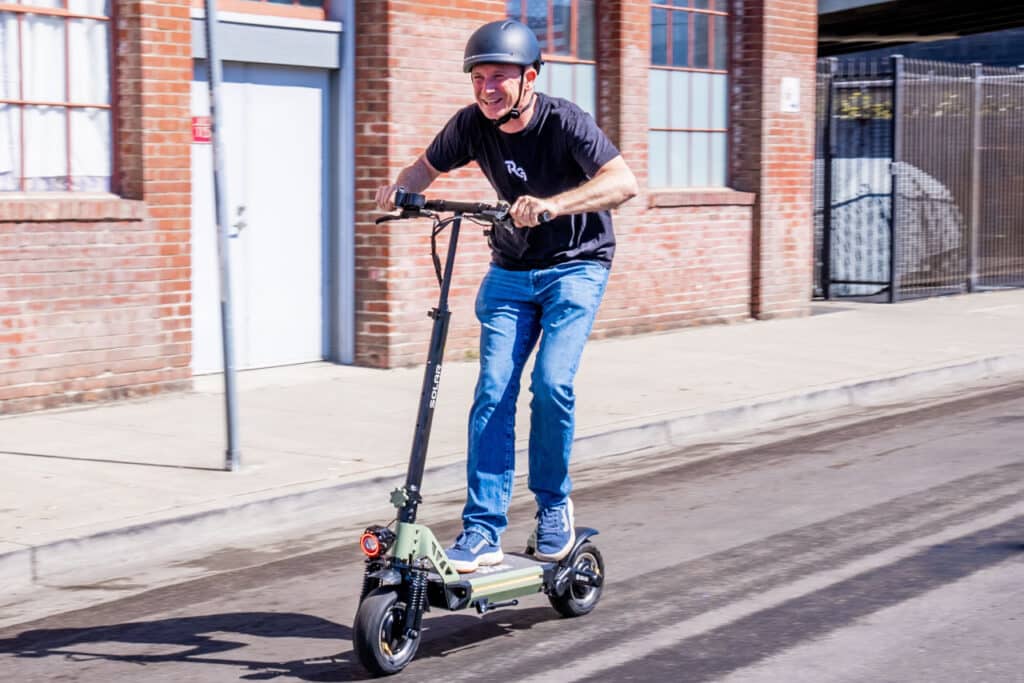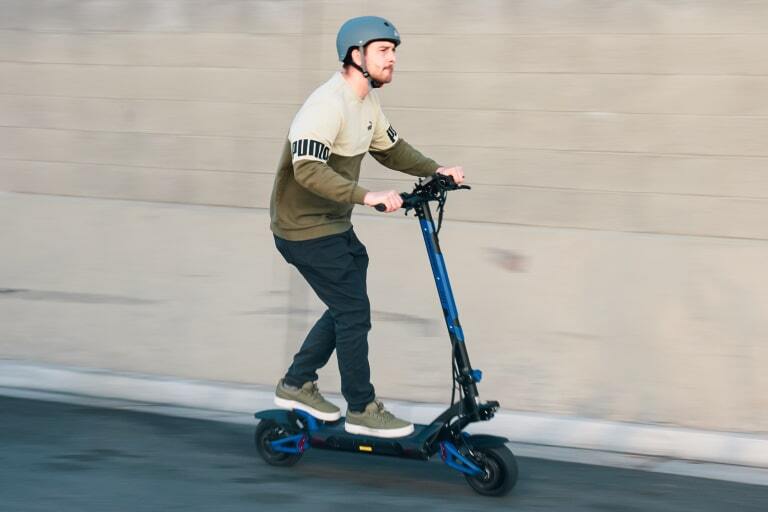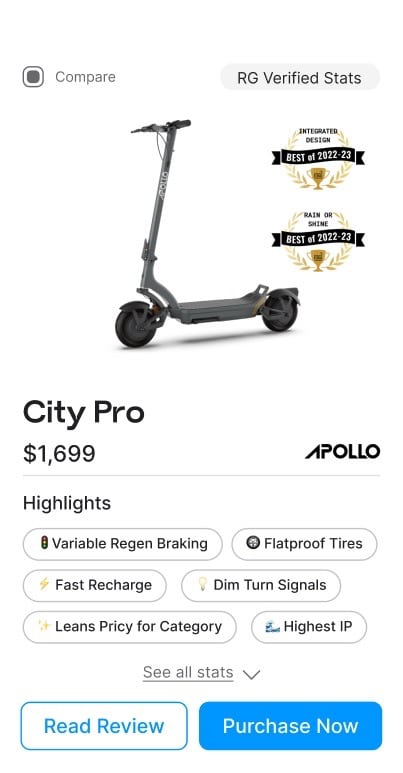
When will UK government change laws on e-scooters?
Will UK government change laws on e-scooters? It's a question many UK electric scooter enthusiasts have been asking for a long time, and one that always creates a sense of ambiguity.
The UK is one of the global forces known for embracing technology and welcoming changes that make the way its residents live, work and travel more convenient. However, there's a severe delay in legalizing these environmentally sustainable and highly portable modes of transportation.
Despite numerous countries in Europe, such as Austria, Belgium, France, and Germany, legalizing e-scooters, the UK government is yet to make its move, resulting in frustration for people who are desperate to get their privately owned e-scooters on the road.
While many expected electric scooters to be fully legalized by the middle of 2022, further delays are still inevitable. The good news is there's every reason to believe that e-scooters will be able to go from private land to public roads in 2023.
So, if you're wondering when will the UK government change laws on e-scooters, read on...
The UK is one of the global forces known for embracing technology and welcoming changes that make the way its residents live, work and travel more convenient. However, there's a severe delay in legalizing these environmentally sustainable and highly portable modes of transportation.
Despite numerous countries in Europe, such as Austria, Belgium, France, and Germany, legalizing e-scooters, the UK government is yet to make its move, resulting in frustration for people who are desperate to get their privately owned e-scooters on the road.
While many expected electric scooters to be fully legalized by the middle of 2022, further delays are still inevitable. The good news is there's every reason to believe that e-scooters will be able to go from private land to public roads in 2023.
So, if you're wondering when will the UK government change laws on e-scooters, read on...
The Current Laws Surrounding Privately Owned E-scooters

Most people in the UK can rent an electric scooter through one of the many ride-sharing programs run by providers such as Lime, Voi, and Bird. Rental scooters are allowed on public roads as long as riders adhere to the regulations set in place by the government.
These Regulations State That:
- Individuals must have a Category Q allowance on their driving license.
- The electric scooter should stay on the road or cycle lanes but avoid motorways and pavements.
- Only one person at a time should ride the scooter.
- Riders can use their phone to set the navigation system but must not use it for anything else while using the e-scooter.
- People must be completely sober when using the scooter or face legal implications.
At the moment, if anyone uses their e-scooter on public roads, the current law states that they could incur penalty points on their driving license, face a fine, or the police can impound their scooter.
London especially has problems regulating privately owned e-scooters and seized over 500 scooters in one fateful week of June 2021 (City A.M.).
Statistics from Living Streets also published a report stating that at least 750,000 private e-scooters are on public streets in Britain, while the Daily Mail places the number at over one million private scooters, despite the law restricting them.
While these scooters are often impounded, it shows the sheer popularity of this convenient mode of transportation. The issues aren't with scooters themselves, but the lack of movement on legalizing them, as many other countries have. Just when will the UK government change laws on e-scooters?
People are frustrated with the government and police because rental e-scooters have their benefits, and the full legalization of private scooters would hopefully create a sense of responsibility among users and pave the way for a more sustainable future.
When Will the UK Government Change Laws on E-scooters? The Latest Updates on Private E-scooters
While many people believed that the UK government would make privately owned e-scooters legal by the middle of 2022, officials recently announced that the trials would extend to November 2022 - making it unlikely that the UK government changes the laws on e-scooters this year.
However, despite the extension, some positive signs indicate the country is planning significant changes to the law, perhaps in 2023, which will enable people to use their private e-scooter instead of public transport or relying on a car.
The Queen's speech (delivered this year by Prince Charles) hinted at the future transportation laws that would encourage more sustainable alternatives to petrol-guzzling cars. The future King of England stated:
"My Government will improve transport across the United Kingdom, delivering safer, cleaner services and enabling more innovations. Legislation will be introduced to modernise rail services and improve reliability for passengers."
Following that initial statement, the UK Department For Transport unveiled its plans to create a new category for electric scooters, which will enable them to become legal and help the government meet its effort to become a more environmentally friendly country.
Baroness Vere released the following statement:
"Safety is at the heart of our plans to create a regulatory framework for smaller, lighter, zero-emission vehicles, sometimes known as e-scooters. Their popularity is clear, and new rules are needed to improve safety and crack down on illegal use whilst unlocking innovation and growth in this emerging multi-billion pound industry."
"New powers would allow the government to decide the vehicles that fall into this new category in the future and how they should be regulated to make sure that they are safe to use. We hope that e-scooters will be the first of these vehicles."
So, while the laws will stay the same for now, the future looks bright for electric scooters, as the transport bill will offer people a cheaper and more convenient way to travel while contributing to the global effort to reduce emissions.
However, despite the extension, some positive signs indicate the country is planning significant changes to the law, perhaps in 2023, which will enable people to use their private e-scooter instead of public transport or relying on a car.
The Queen's speech (delivered this year by Prince Charles) hinted at the future transportation laws that would encourage more sustainable alternatives to petrol-guzzling cars. The future King of England stated:
"My Government will improve transport across the United Kingdom, delivering safer, cleaner services and enabling more innovations. Legislation will be introduced to modernise rail services and improve reliability for passengers."
Following that initial statement, the UK Department For Transport unveiled its plans to create a new category for electric scooters, which will enable them to become legal and help the government meet its effort to become a more environmentally friendly country.
Baroness Vere released the following statement:
"Safety is at the heart of our plans to create a regulatory framework for smaller, lighter, zero-emission vehicles, sometimes known as e-scooters. Their popularity is clear, and new rules are needed to improve safety and crack down on illegal use whilst unlocking innovation and growth in this emerging multi-billion pound industry."
"New powers would allow the government to decide the vehicles that fall into this new category in the future and how they should be regulated to make sure that they are safe to use. We hope that e-scooters will be the first of these vehicles."
So, while the laws will stay the same for now, the future looks bright for electric scooters, as the transport bill will offer people a cheaper and more convenient way to travel while contributing to the global effort to reduce emissions.
The Bill Will Address Safety Concerns Surrounding Electric Scooters
Baroness Vere's speech gives us reason to believe that e-scooters could be one of the first new electric personal transportation devices the government legalizes, with other modes of transportation following suit.
These include:
These laws would significantly differ from electric bikes, which don't require insurance or registration. In the UK, an e-bike manufacturer self-certifies each model, automatically confirming it's safe for road use.
As long as users follow the Highway Code, they don't need to worry about insurance or tax when using a bike, and the government might try to find a happy medium for electric scooters.
Users could potentially register their e-scooter but avoid paying vehicle tax and choose whether they want insurance. However, this ultimately depends on whether manufacturers are responsible for certifying their scooter models.
These include:
- Seated electric scooters
- Lightweight e-mopeds
- Cargo e-bikes
These laws would significantly differ from electric bikes, which don't require insurance or registration. In the UK, an e-bike manufacturer self-certifies each model, automatically confirming it's safe for road use.
As long as users follow the Highway Code, they don't need to worry about insurance or tax when using a bike, and the government might try to find a happy medium for electric scooters.
Users could potentially register their e-scooter but avoid paying vehicle tax and choose whether they want insurance. However, this ultimately depends on whether manufacturers are responsible for certifying their scooter models.
Politicians Get In on the Action

Rental e-scooter operator Tier is also getting ready to back the legislation change by giving members of parliament a chance to try out their e-scooters. The House Of Lords has discussed electric scooters at length, but government officials have conflicting opinions regarding whether they should be legalized.
Popular politicians such as Florence Eshalomi and Lord Iain McNicol attended a training session where they could try electric scooters for themselves and learn how future legislation could address road safety concerns.
These sessions show the government's support for legalizing e-scooters while addressing the potential (and very avoidable) adverse impacts on other road users.
London is paving the way for the rest of the UK by working alongside Tier and Transport For London to create a 'universal sound' for rental e-scooters, which could also become law for private e-scooters.
This sound will alert people with sight problems and other road users/pedestrians to an oncoming scooter, creating a safer experience for everyone concerned.
Popular politicians such as Florence Eshalomi and Lord Iain McNicol attended a training session where they could try electric scooters for themselves and learn how future legislation could address road safety concerns.
These sessions show the government's support for legalizing e-scooters while addressing the potential (and very avoidable) adverse impacts on other road users.
London is paving the way for the rest of the UK by working alongside Tier and Transport For London to create a 'universal sound' for rental e-scooters, which could also become law for private e-scooters.
This sound will alert people with sight problems and other road users/pedestrians to an oncoming scooter, creating a safer experience for everyone concerned.
What the Future Holds for Private E-scooters

The e-scooter trials have offered the UK a way to give commuters and general travelers convenience while reducing the reliance on petrol vehicles and public transport. However, the numerous delays in introducing the laws mean that people still wonder when they'll get to use their private e-scooters.
There are many reasons for the UK government not acting as quickly as other countries, and understanding them can shed some light on what the future might hold for these compact and sustainable personal modes of transportation.
Let's look at the factors that will define the future of e-scooters.
There are many reasons for the UK government not acting as quickly as other countries, and understanding them can shed some light on what the future might hold for these compact and sustainable personal modes of transportation.
Let's look at the factors that will define the future of e-scooters.
Environmental Initiatives
It's no secret that the UK is passionate about its attempts to reduce carbon emissions and contribute to the global effort for a more sustainable environment.
While many sectors create greenhouse gas emissions, transport is the biggest culprit, accounting for 24% of all emissions in 2020 (Gov.UK).
Compared to other sectors such as energy suppliers, business, residential, and agriculture, it's clear that cutting transport emissions can positively influence the environment.
These devices could create a new way of living, with e-scooter riders being able to travel around while avoiding public transport or the expenses associated with owning a car.
While many sectors create greenhouse gas emissions, transport is the biggest culprit, accounting for 24% of all emissions in 2020 (Gov.UK).
Compared to other sectors such as energy suppliers, business, residential, and agriculture, it's clear that cutting transport emissions can positively influence the environment.
These devices could create a new way of living, with e-scooter riders being able to travel around while avoiding public transport or the expenses associated with owning a car.
Potential Safety Improvements Upon Legislation Change
There are conflicting opinions regarding whether rental or private e-scooters are safer, with some leaning towards the rental side. But, here's the thing; rental companies are regulated, while privately owned e-scooters don't have legislation.
Once the government legalizes e-scooters, manufacturers - and users will also have to comply with safety laws that protect other road users.
While rental schemes allow anyone to rent a scooter at a low price, private e-scooter users will take better care of their more expensive models, which will inevitably alleviate some road safety concerns.
Once the government legalizes e-scooters, manufacturers - and users will also have to comply with safety laws that protect other road users.
While rental schemes allow anyone to rent a scooter at a low price, private e-scooter users will take better care of their more expensive models, which will inevitably alleviate some road safety concerns.
E-Scooter Accidents Are Less Common Than You Think
Local authorities have expressed their concerns that e-scooters aren't safe and could make UK roads more dangerous. However, studies suggest that this couldn't be further from the truth, and bikes and motorcycles are more hazardous than scooters.
According to research from The Royal Society For The Prevention Of Accidents (RoSPA) released, the accident rate for scooters, bikes, and motorcycles per one million miles which were:
This evidence shows that when scooters are regulated effectively, the result can be a safe and highly convenient experience for everyone.
According to research from The Royal Society For The Prevention Of Accidents (RoSPA) released, the accident rate for scooters, bikes, and motorcycles per one million miles which were:
- E-Scooters: 0.66 accidents/collisions per one million miles
- Bikes: 3.33 accidents/collisions per one million miles
- Motorbikes: 5.88 accidents/collisions per one million miles
This evidence shows that when scooters are regulated effectively, the result can be a safe and highly convenient experience for everyone.
Changes to the Highway Code
The Highway Code underwent significant changes in January 2022, including a hierarchy to determine road user responsibility should an accident occur. The H1 Rule states that fast, large, and heavy vehicles have the biggest responsibility to protect the most vulnerable road users (pedestrians).
Under these laws, e-scooters would probably land between cycles and e-bikes, as they're faster than traditional bicycles but usually lighter than e-bikes.
When the new legislation finally comes into action, people will have a deeper understanding of how e-scooters will fit into the law and be able to take responsibility for their actions.
Under these laws, e-scooters would probably land between cycles and e-bikes, as they're faster than traditional bicycles but usually lighter than e-bikes.
When the new legislation finally comes into action, people will have a deeper understanding of how e-scooters will fit into the law and be able to take responsibility for their actions.
What Will the Future Laws Be for E-scooters?
The scooter-sharing scheme trials have allowed local authorities and the government to evaluate the feasibility of private e-scooters, so many current regulations will likely continue when the new laws come into action.
Private e-scooter users will probably have to:
It certainly makes sense to regulate the use of private models, and the success of the coming legislation will depend on how well these laws help people avoid potential negative impacts of private e-scooters.
To successfully make scooters road-legal and allow the UK public to benefit from all that they offer, everyone must contribute to reducing accidents involving e-scooters by adhering to the existing guidelines and protecting other road users.
Private e-scooter users will probably have to:
- Hold a provisional driving license
- Use an e-scooter with a maximum speed of 15.5 miles per hour (Many believe this will be the speed limit for densely populated areas with pedestrians, but the public road speed limit might be more flexible).
- Take all the necessary safety precautions, including equipping their scooter with lights, and a warning bell/horn
- Ensure their scooters pass a range of checks to verify their safety
- Provide certification for the scooter (much like Germany's system)
It certainly makes sense to regulate the use of private models, and the success of the coming legislation will depend on how well these laws help people avoid potential negative impacts of private e-scooters.
To successfully make scooters road-legal and allow the UK public to benefit from all that they offer, everyone must contribute to reducing accidents involving e-scooters by adhering to the existing guidelines and protecting other road users.
Related Reviews


KQi Air


EQ


Ninebot F2 Pro


RS5+
Scooter with Swappable Battery!

Our newsletter has the biggest discounts, newest scooter reviews, best how-to’s, & no spam. Unsubscribe anytime!
Find your perfect ride
We built a tool that makes it effortless for you to find a scooter perfect for your lifestyle. Filter, compare, and sort through almost every electric scooter in the industry.
jump injump in





